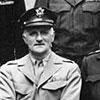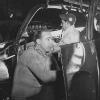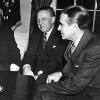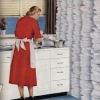Download Transcript: The Kitchen Debate
The antagonism between western democracies and communist countries allied with the Soviet Union lasted for nearly five decades. It became known as the “Cold War” because no shots were directly exchanged between the two belligerents. Instead, both sides struggled in numerous ways to demonstrate the superiority of their economic and political systems. Against that backdrop, the production of consumer goods like affordable dishwashers became a way for America to demonstrate capitalism’s ability to dramatically increase the average citizen’s standard of living.
In 1959, the power of America’s burgeoning industrial capacity went on display in Moscow in the form of a model kitchen from an average American ranch home. Against that backdrop, Vice President Richard Nixon and Soviet Premier Nikita Khrushchev took part in what became known as the “kitchen debate,” with each attempting to emphasize the benefits of their own national system. Nixon stressed capitalism’s ability to provide a high standard of living to average Americans, and the material prosperity available in the postwar United States. Khrushchev, in turn, suggested that the American obsession with gadgets signified a society that had substituted materialism for real values. Questioning the necessity of the labor-saving devices on display in the model kitchen, Khrushchev acerbically asked whether the Americans also had devised a machine that put food in their mouths and pushed it down their throats.
Source:
C-SPAN, “Nixon Khrushchev Kitchen Debate” July 1, 1959 (accessed February 8, 2011).












